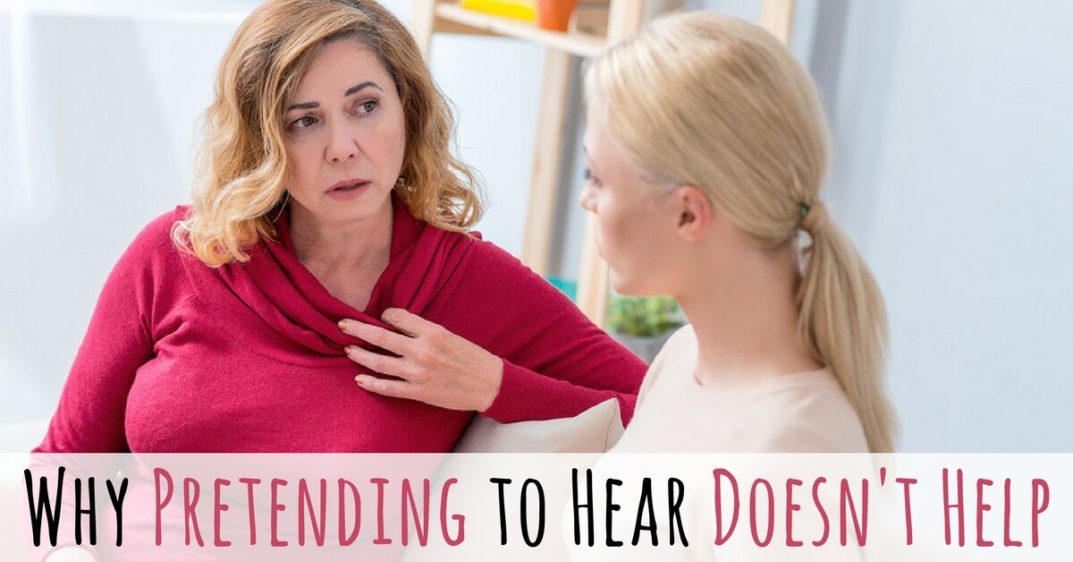Fake it till you make is good advice. Sometimes. Unfortunately, when it comes to hearing loss, pretending to hear doesn’t do very much to help. In the best-case scenario, you get away with it and walk away with your deep secret protected: your hearing loss prevented you from a hearing a word that was said. But that also means that you missed either important information or a chance at connection, possibly both. At the end of the day, that sounds more like a lose-lose scenario.
We’ve all done it, whether hearing loss is part of the problem or not, pretending to hear or comprehend something we didn’t in social situations is universal. But, it isn’t a long term successful strategy.
Why we pretend to hear
There’s a number of reasons we might pretend to hear or understand something we didn’t, but they all come back to protecting ourselves. No one wants to feel stupid. We might be sensitive to holding a group back instead of asking someone to repeat themselves or clarify. Or, we might simply be unsure of how to communicate our hearing loss to someone new, choosing instead to gloss over it until a better time. The question of whether that better time ever truly arrives is a worthy one. If we protect our hearing loss and don’t develop the strategies to ask for clarification, then we risk having our secret found out in unavoidable ways. These moments of unavoidable disclosure also tend to be the most dramatic and potentially embarrassing, too.
Veering towards isolating behaviors
It’s no wonder that people with undiagnosed or untreated hearing loss tend to self-isolate. Only a very small amount of people over the age of 50 with hearing loss seek treatment, around 14%. That sounds like an inordinately large number of people who just with that their hearing loss would go away or solve itself. In the meantime, being unable to hear can affect our small, daily behaviors in gradual ways that lead to unhealthy patterns.
It begins in subtle ways, as we turn down invitations for large group gatherings in which hearing is particularly challenging. Perhaps you cut short the interaction with the checkout person at the grocery store. Fairly soon, instead of engaging with the world, opportunities for connection are avoided. Human beings are fundamentally social creatures and without this stimulation, depression and anxiety can quickly emerge.
Working on a disclosure strategy
Instead of burying your head in the sand when it comes to your hearing loss, take control of your life. Instead of pretending to hear, hoping you get away with the charade, try to develop a disclosure strategy. It doesn’t have to be a four-paragraph story outlining the highs and lows of your hearing loss diagnosis. All you truly need are a few sentences. They might sound something like, “I have trouble hearing and I missed that. Could you repeat it?” If that sounds really difficult to imagine saying, that’s completely normal. We sometimes have emotions and perceptions of self-worth wrapped around our soft spots or areas of weakness. Be gentle with yourself and practice those sentences alone. Ask a loved one or family member to practice with you. Sometimes it’s easier to try out these new things with a complete stranger, so try taking it out for a spin with the bank teller or even a telemarketer! Find some low-pressure situations you can apply this new strategy with. Over time, the sensitivity you have will decrease and you can pipe up in more important social situations.
Notice. Interrupt. Forgive.
Because change only happens in the moment, having a prepared way of dealing with uncomfortable hearing situations allows you to interrupt the cycle of shame that is inherent in pretending to hear when we do not. A good mantra to remember in these moments is, “Notice. Interrupt. Forgive.” Notice that you’re feeling uncomfortable about disclosing your hearing loss or trouble hearing. Interrupt this by using your disclosure statement. Forgive yourself for any feelings of shame, embarrassment or self-judgement that arise.
Give intervention a go
If you think you struggle unnecessarily with your hearing, odds are that you have some degree of hearing loss. The best way to improve your situation is to have your hearing tested with us at Comprehensive Ear and Hearing and investigate possible treatments. Taking control over your reality is a healthy way to boost confidence and the single greatest predictor of quality of life satisfaction.


